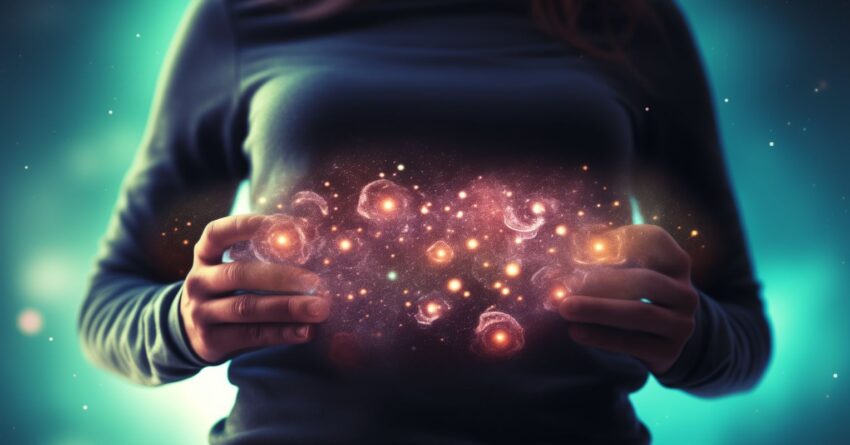
Gut microbes are our protectors.
Source: Midjourney
“With every day we live and every meal we eat we influence the great microbial organ inside us—for better or for worse.” —Giulia Enders
The gut-brain axis adds an amazing new set of tools to the psychological toolkit. But some people wonder, quite reasonably: Why would microbes be involved in our mental health? The human brain is seemingly the pinnacle of evolution. How could such tiny creatures have gained so much leverage over it?
Surprisingly, there is a pretty solid answer to this question: Animals long ago made a bargain with unsanitary microbes to fight off even worse microbial pathogens lurking in the environment. Although we have an immune system designed to take on these pathogens, it’s difficult for us to keep up. Bacteria can multiply every 20 minutes or so, each time potentially mutating into a more dangerous form. Our comparatively giant, lumbering bodies are too slow to accommodate this frantic rate of reproduction.
In the evolutionary race, microbes run circles around us. And that is the prime reason that we recruited our own batch of microbes to work on our side: It takes a germ to fight a germ.
Animals offer a regular buffet in a warm, moist intestine; in return, these gut microbes—collectively called the microbiome—kill off the disease-causing bugs that plague our world. It’s not a perfect relationship, but it has worked pretty well for half a billion years, give or take.
As a bonus, gut microbes can convert otherwise worthless dietary fiber into high-performance fuel. Over time, humans have become comfortable enough with the relationship to outsource some essential tasks to those microbes, including the production of vitamins K and B12.
Effect of Colorectal Surgery
But do we really need a microbiome? After all, people who have had their colons removed still do OK even though they are missing 90 percent of their microbiome. However, Julie Cornish and colleagues at Cardiff University found that these people often become depressed. They found that “the prevalence of anxiety, depression and PTSD appears to be high in patients who have undergone colorectal surgery. Younger patients and women are particularly at risk.” Part of those mood changes might be due to the loss of psychobiotics—microbes that can improve your mood.
Just 20 years ago, most scientists believed that gut microbes were commensal—Latin for “sharing a table.” They were considered neither good nor bad, just benignly there. But researchers including Nobuyuki Sudo, John Cryan, Ted Dinan, Catherine Stanton, Rob Knight, Emeran Mayer, and others started to realize that there was a connection between the microbiome and mood. They were able to show that mice with no bacteria at all, so-called germ-free mice, had an unusual response to stress.
Research Involving Mice
Germ-free mice are tricky animals to work with. Because they have no microbes of their own to defend themselves against environmental pathogens, they are fragile. They need to be housed in special clean cages and fed sterilized food. The slightest contact with the ordinary germy world could kill them. These animals teach us just how important a microbiome is to good mental health. Hundreds of studies with these mice, still ongoing, have been a boon to fleshing out the mysteries of the microbiome.
Mice, it turns out, are comfortable eating poop—their own and others’. This seems unsavory to us, but it again highlights just how important microbes are to animal health. Eating poop is a convenient way to pick up and maintain a good set of microbes, and many animals do it, especially young ones.
As well as poop, mammals can obtain a healthy microbiome through breast milk, which contains a carefully curated collection of the mother’s gut microbes. Every creature on the planet seems to have a mechanism—sometimes quite elaborate—for transmitting a healthy microbiome to its offspring. It is that important. A bad childhood microbiome could lead to a lifetime of subpar health and mood.
Microbiome and Mood
So how is the microbiome associated with mood? Microbes, coming from a decidedly different branch of the tree of life, can’t really talk to us. But, shockingly, they can produce neurotransmitters identical to those we use in our brain, including dopamine, serotonin, and others. These “feel-good” chemicals are the basis of many antidepressants. Microbes have the ability to send an all-OK signal to the brain via the vagus nerve that connects the gut to the brain. And if things go awry and the microbiome starts to become unbalanced—called dysbiosis—they can send anxiety-promoting signals to the brain as well.
Worsening dysbiosis can allow pathogens to attack our gut lining. That can lead to infection and, over time, chronic systemic inflammation. Our brain responds to that with anxiety and depression. It’s hardly a perfect communication, but if we are alert to it, we can take steps to respond appropriately. Namely, we can alter our diet to bring back some balance. That typically involves cutting the sugar favored by pathogens and increasing the fiber loved by beneficial bacteria. Yes, that means eating more veggies and fewer treats, just as our moms told us.
Microbiome Essential Reads
It is surprising how many cases of depression and anxiety can be alleviated by eating a diet that looks more Mediterranean and less Western. The “standard American diet,” full of highly processed food, has an entirely appropriate acronym: SAD.
So, our gut microbes are not an accident; they are essential partners in our struggle to stay alive in a world that wants to eat us. If we treat them right, they will keep us healthy and happy. If we abuse them with crappy diets, they can make us miserable, depressed, and anxious.
It’s our choice to make.
